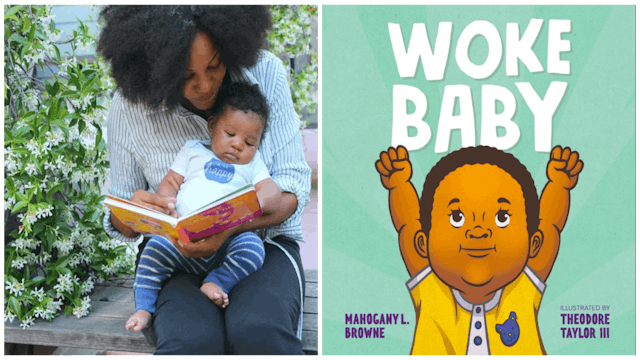Why Babies Need Diverse Children's Books

Before my son was born, my husband’s co-workers threw us a book shower. In lieu of little onesies and diaper rash cream, they gifted us with dozens of brightly colored board books with stories about everything from a little pig who doesn’t want to go to bed to activism from A to Z. It had been eight years since I’d had a baby. As we unwrapped title after title, I was blown away by the diversity of the characters and stories. We’ve come a long way.
We still have a long way to go, though.
Although my baby has a bookcase filled with books featuring every type of human being on the planet, I wish the same reflection of our world was represented in all households. Sure, there’s more of a selection now, but it’s still not enough. When you look at the total amount of children’s books that are available, those that are representative of children of color are just a drop in the bucket. There’s a reason for that. Lee & Low, a publisher of diverse books, shared research showing that just under 80% of publishing staff and review journal staff at children’s book publishing agencies are white.
No wonder we need more diverse books.
Mahogany L. Browne is an educator, activist, and author the recently released children’s book Woke Baby. She brought up another great reason that diversity in literature is important from a young age. It teaches kids to care about each other. Babies who are indoctrinated to accept and respect grow up to be adults who do the same. Browne says, “In what areas do you read, see, and know by heart text by writers of color? There is no one genre or theme. We need different voices everywhere. The homogeneous voice of child rearing has disabled our ability to empathize. Sympathy is not enough.”
What happens when a child is read a book about a family who lives in a two bedroom apartment with their parents and grandparents because that’s what they do in their culture? They have an appreciation for the classmate who lives in a different neighborhood. They understand that their friend isn’t better or worse off than they are. They’re just different.
When I read a book to my daughter about a girl about her age growing up in a war ravaged country, she asks questions and we have conversations. They’re age appropriate, but enlightening, and allow her to have a broader sense of what life is like for people who are not like her. And to start to understand that her privilege can be used, not just for her own benefit, but to make life better for others. She’s not too young, and it’s not too early.
As Browne says, “My daughter was 3 0r 4 when we talked about words being powerful. I don’t think there is an exact time we should or should not talk about the need for our children being treated equally. The time is now. In the womb. In the crib. Right now.”
She says that she wrote Woke Baby because having conversations about intersectionality with adults can be tiring. “Talking to kids about it,” Browne says, “opens up my entire world of feeling and thinking. It is all so possible with young people.”
She’s right, and I get it. Over the last couple of years, I have exhausted myself trying to get folks to understand what it’s like to be black in America. I’ve done everything from sharing personal anecdotes, referring to history, suggesting books and films, and reposting articles from people who are smarter than me. I’ve taught workshops, filmed videos, and had one-on-one conversations. Nothing seems to stick.
One thing I know for sure, though, is that parents will take care of their babies. Part of that care is reading to them, and filling their bookshelves with beautiful books. Bedtime stories are a way of life for many, many families, and access to diverse books can be the gateway to more acceptance and understanding.
It’s hard to change an adult’s mind, but babies? Children? They’re still open to the possibility that different is good. If we can reach their parents through picture books and other literature, we might still have a chance.
Here are a few diverse books for babies, written by diverse authors, to start inspiring your own woke baby:
Woke Baby by Mahogany L. Browne
photo credit: Amazon
Just because they’re little, it doesn’t mean they can’t be woke. This book is an instant classic for the world’s tiniest activists.
A is for Activist by Innosanto Nagara
photo credit: Amazon
Rich in color and incredibly poetic, this baby book might even inspire you to be better advocate, Mama.
Dream Big, Little One by Vashti Harrison
photo credit: Amazon
All of my favorites are in this book by the author who brought us Little Leaders. Start your babies early celebrating the accomplishments of black women.
Feminist Baby by Loryn Brantz
photo credit: Amazon
If you have a strong-willed baby who seems to know exactly what they will and won’t do, they just might be a feminist like the baby in this book!
Daddy, Papa, and Me by Lesléa Newman
photo credit: Amazon
Love is love is love, and family is family. Teach your baby that now and you won’t have to teach them in the future.
Skin Again by bell hooks
photo credit: Amazon
It’s okay to be different. Beautiful, even. This book starts planting that seed of thought early.
Editors may receive samples and/or a share from purchases made via links on this page. All opinions are our own.
This article was originally published on